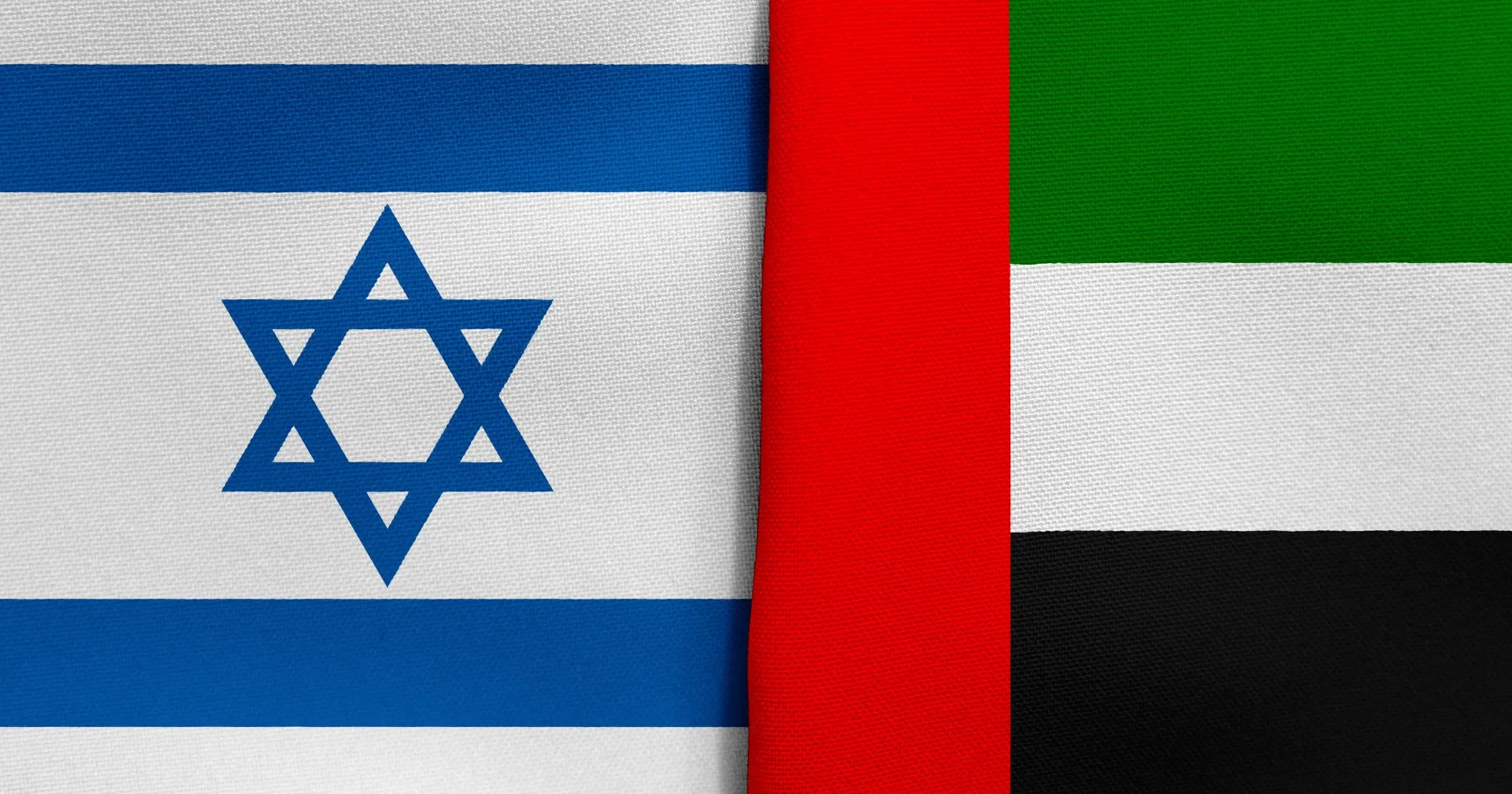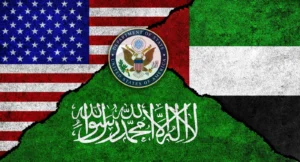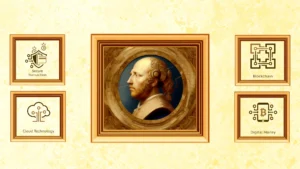Israel’s New Government and the Future of the Abraham Accords: Trade and Economic Implications
New Coalition Ousts Netanyahu
On June 2, Yair Lapid, leader of Israel’s centrist Yesh Atid (There Is a Future) Party, announced the formation of a new coalition government, heralding the end of Benjamin Netanyahu’s twelve-year rule as the Jewish State’s longest-serving prime minister. On June 13, Israel’s parliament approved the government by a narrow 60-59 vote, putting an end to a political crisis that had sparked four elections in two years.
Israel’s new unprecedented hybrid coalition of eight parties – spanning the full ideological spectrum from right to left and including the Islamist Arab Raam (United Arab List) Party – is led by Prime Minister Naftali Bennet from the small right-wing nationalist Yamina (New Right) party. The forty-nine-year-old self-made tech millionaire will be followed by the former newspaper columnist, talk show host, and current Foreign Minister Yair Lapid, slated to become prime minister in 2023.
Netanyahu – currently on trial for corruption charges based on fraud, breach of trust and accepting bribes – remains the head of the Likud (National Liberal Movement), the largest party in parliament. If a single party in the new coalition bolts, Israel’s 36th government will lose its parliamentary majority, giving Netanyahu an opening to return to power.
Chances of such a dissolution of the governing coalition are substantial, given that its members are united in opposition to Netanyahu, but agree on little else. The coalition may not be cohesive enough to advance major policy initiatives on divisive hot-button policy issues such as the future status of the West Bank and Gaza Strip. The new government is expected to avoid rifts by concentrating on domestic policy issues that have deep consensus support, such as passing the country’s first budget since 2018, repairing infrastructure, and advancing post-pandemic economic relief.
Foreign Policy Implications for Gulf-Israel Relations
Despite its ideological fissures and possibly precarious hold on power, the new government is expected to pursue the status quo on crucial foreign policy issues such as Israel’s firm opposition to the Vienna talks between the US and Iran that aim to restore the Joint Comprehensive Plan of Action, the so-called 2015 Iran nuclear deal.
Some initial concern about the future prospects of the Abraham Accords under Israel’s new government stemmed from the perception that the agreement was the personal achievements of Netenyahu and former US President Donald Trump and would not have happened without them. However, both Bennett and Lapid have expressed their strong commitment to expanding ties with the Gulf states while in office, and have exchanged messages with senior Emirati officials.
As a sign of the solidification of Israel-Gulf relations, Foreign Minister Lapid made his inaugural visit to the UAE at the end of June 2021 – the first ministerial visit since the two states established ties last year – to open an Israeli Embassy in Abu Dhabi and a consulate in Dubai.
A day after his historic two-day visit Lapid published a joint op-ed with his Emirati counterpart H.H Sheikh Abdullah bin Zayed Al Nahyan in The National entitled “UAE-Israel peace is more than an agreement. It’s a way of life.” The two ministers highlighted that that the Accords have contributed to economic growth, cultural exchange, and political cooperation between Israel and the Gulf while benefiting regional trade and investment relations in a range of sectors ranging from healthcare, aviation, agriculture, and education to telecommunications, energy, technology, and tourism.
Trade and Economic Implications
At the time of the signing of the Abraham Accords on the White House lawn on September 15 of last year, Israel’s Finance Ministry’s deputy chief economist, Lev Drucker, stated he saw a potential for substantial trade levels between the countries, starting at $2 billion and building up to $6.5 billion once cooperation matures.
Moody’s Investors Service (August 2020), citing Israeli Ministry of Economy and Industry estimates, offered more conservative projections that normalization could value Israeli exports to the UAE at $300-$500 million a year, constituting 0.4 per cent of its total exports; UAE investments in Israel could reach $350 million a year, about 1.9 per cent of inbound foreign direct investment.
Since the establishment of diplomatic relations between the Abraham Accord signatories, commercial ties between the countries have rapidly expanded. In June 2021, the Associated Press reported that over $354 million was traded between Israel and the UAE, while some 25 agreements in more than 15 sectors were signed, in just 9 months. Alongside these private flows, the United States, Israel, and the UAE established a $3 billion fund—the Abraham Fund—to promote economic cooperation in the region with the purposes of job creation, raising the standard of living, and promoting economic growth.
Despite the risk of a temporary setback in times of rising regional geopolitical tensions, the cooperation that is currently being developed appears to be deep and broad-based, and bids fair to not be easily undone. It seems that in case of Israel and the UAE in particular, the seeds of peace have fallen on fertile ground, mainly due to high level of economic development and mutual geopolitical interests and concerns, including the perception of a looming Iranian threat.
Trade and economic agreements between the UAE and Israel already include pacts on double taxation and free trade. Emirati Minister of Economy Abdulla bin Touq Al Mari has termed these treaties a “dividend of peace” that will strengthen ties between the region’s two most innovative economies.
A flurry of business delegations and other economic engagements have taken place between Israel, the UAE and Bahrain, with further growth expected in sectors ranging from trade in goods (including oil, diamonds/precious metals, and defense), services (including medicine, digital health, water, environment and agriculture technology, cyber, and financial technology) and tourism. While these new trade and capital flows hold the potential to immediately benefit Israel and the Gulf States, they also stand to have a significant spillover effect on the entire MENA region and broader global economy.
One example of the economic and trade dividends of the Accords is in the energy sector; for decades foreign firms were reluctant to engage with Israel for fear of losing access to key Middle East oil markets. In one of the largest commercial deals yet between Israel and the UAE, in April 2021, Israel’s Delek Drilling firm announced plans to sell its 22 percent direct stake in the Tamar natural gas field in the Mediterranean Sea, off Israel’s coast, to investors led by Abu Dhabi’s state-owned Mubadala Petroleum for $1.1 billion.
A month earlier, in March 2021, the UAE announced the establishment of a $10 billion fund to invest in energy and other strategic sectors of Israel’s economy. Already in October 2020 an agreement was announced between Israel’s state-owned Europe-Asia Pipeline Company (EAPC) and the newly formed UAE-Israeli Med-Red Land Bridge (MRLB) to transfer crude and oil products between the Red Sea and Mediterranean. The deal could be worth $700-800 million annually within a few years and operations may start in 2021.
The economic impact of the Accords has not been limited to the energy sector. On August 31, 2020, Israel’s flagship carrier El Al operated the first-ever direct commercial flight between Tel Aviv and Abu Dhabi, followed by a first flight from Israel to Manama on October 18. The UAE’s Etihad Airways launched its first commercial flight to Israel a day later, on October 19. In another first, Saudi Arabia opened its airspace to the flights – and reportedly agreed to allow all such flights from Israel.
The impact of this breakthrough cannot be overstated. It has allowed national carriers in all three countries to shorten distances to Europe and to central, southern, and eastern Asia. One intriguing possibility is the revival of ancient trade routes that once connected the Middle East to the rest of the world.
More importantly, Israel and the UAE now allow their citizens reciprocal visa-free travel. These developments have contributed to nearly 200,000 Israelis visiting the UAE over the past nine months. This figure has the potential to grow further: in 2019, 4.3 million Israelis, nearly half of the country’s 9.1 million citizens, traveled abroad, according to the country’s Central Bureau of Statistics (CBS). Increased cooperation in this sector can multiply investment opportunities between the two states and develop the UAE’s tourism industry, projecting revenue of $85 billion by 2027. Specific projections aside, existing and developing factors strongly suggest the potential for this sector to serve as a pillar for commerce, and for people-to people relations.
Conclusion: Prospects for Economic Development
Historical maps of the Middle East used to portray the region as the center of the world. For decades, this ancient part of the Silk Road – facilitating trade, economic, cultural, political, and religious links between East and West – was cut off due to political disagreements, inter- and intra-state conflicts and a culture of distrust that threatened regional economic development and international peace and security.
Through the Abraham Accords the UAE and Bahrain – under the guidance of H.H Sheikh Khalifa bin Zayed bin Sultan Al Nahyan, H.H Sheikh Mohammed bin Rashid Al Maktoum and H.M. King Hamad bin Isa bin Salman Al Khalifa – became the third and fourth member states of the 22-nation Arab League – the first since Egypt in 1979 and Jordan in 1994 – to establish full diplomatic and trade relations with Israel.
From August to December 2020, two more nations – Sudan and Morocco – initiated diplomatic normalization of bilateral ties with Israel. These developments constituted the first major breakthrough for regional peace in more than a quarter century: since the Oslo accords, which Israel’s late President Shimon Peres trumpeted as the coming of a “new Middle East” that would bring reconciliation and prosperity to the region.
During Foreign Minister Lapid’s latest visit to the UAE in June 2021, both countries signed an Economic and Trade Cooperation agreement, committing to develop economic relations and the free flow of goods and services, as well as encouraging business and private sector cooperation. More importantly, both sides expressed an ambition of signing a free trade agreement and announced they had already begun discussions on this matter.
As if to allay concerns about political fragility or longevity, Israel’s new government made a point of declaring furtherance and implementation of the Abraham Accords an immediate priority. Emirati leaders were equally clear in welcoming and hosting Foreign Minister Lapid, that their commitment to progress remains firm. Despite recurrent dark clouds, this bright vision of a new Middle East will continue its growth. The realized and promised benefits of rapprochement and partnership between the new Israeli government, the UAE, Bahrain, and other Arab states should long outweigh the variables posed by any one leader or one government.
The Abraham Accords continue to hold the potential to serve as the foundation for greater economic integration throughout the Middle East. They could become a key ingredient of post-COVID growth, and spur a comprehensive peace process across the entire region by demonstrating the tangible, real-world benefits of people-to-people ties, trade, commerce, and mutual cooperation.
Daniel Schatz
Dr. Daniel Schatz is a Visiting Scholar at Georgetown University, a Non-Resident Fellow at TRENDS Research & Advisory in Abu Dhabi and an International Security Program Fellow with New America in Washington D.C. Dr. Schatz holds a doctorate in Political Science from Humboldt University of Berlin. He has served as a Visiting Scholar at Harvard University, Stanford University, Columbia University and New York University. Dr. Schatz’s articles, expert commentary and opinion pieces on contemporary international affairs have appeared in such leading US and international publications and outlets as the New York Times, the Economist, Newsweek, CNN, NBC News, Die Welt and the Wall Street Journal, as well as in peer-reviewed scholarly journals.








